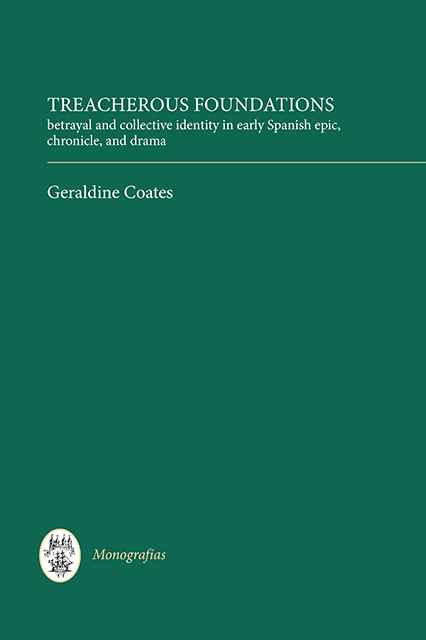 Treacherous Foundations
Treacherous Foundations Book contents
- Frontmatter
- Contents
- Dedication
- Acknowledgements
- Abbreviations
- 1 Introduction
- 2 Trauma and Triumph in the Poema de Fernán González
- 3 ‘Et si desto menguas’: Imperial Decline in the Estoria de España
- 4 ¿Traición tan provada? Treachery Refashioned in Juan de la Cueva
- 5 The Historical Vision of Lope de Vega: Castile and Castidad
- 6 Conclusion
- Works Cited
- Index
6 - Conclusion
Published online by Cambridge University Press: 07 March 2023
- Frontmatter
- Contents
- Dedication
- Acknowledgements
- Abbreviations
- 1 Introduction
- 2 Trauma and Triumph in the Poema de Fernán González
- 3 ‘Et si desto menguas’: Imperial Decline in the Estoria de España
- 4 ¿Traición tan provada? Treachery Refashioned in Juan de la Cueva
- 5 The Historical Vision of Lope de Vega: Castile and Castidad
- 6 Conclusion
- Works Cited
- Index
Summary
Mighty structures collapse on to themselves; for prosperity the powers have set this limit to growth
(Lucan, Pharsalia, bk. 1; 1992: 5)This diachronic study has focused on the way in which treachery —understood as foundational violation, juridical category, and complex literary motif— invites us to consider tensions inherent in the processes of collective identity formation at two compelling points in Iberian history, and to think about these tensions as integral to the production of that identity. The sheer malleability of the concept of treachery has been a constant theme of this enquiry, throughout both medieval and early modern contexts, building up a picture of the complex relationship between central authority and marginal identities, and challenging myths of political hegemony.
The medieval works take full advantage of the elasticity of treachery for reasons of social and political cohesion; the Poema de Fernán González defines treachery within the context of secular and religious value systems, in which lealtad, the highest form of worth, is peripatetic. The reasoning behind this is to create the freedom for the ideological crossover that forms the essential substance of the poem. The poet needs flexibility in order to overcome the difficult task of representing the splitting away of Castile from Leon as a justifiable political action, and an extended example of social lealtad. The flexibility of treachery allows Fernán to shed the rigidity of the heroic type, circular and linear patterns of time to intersect, and the historical identity of Castile to stay the same (87) yet at the same time change (175c), while the ominous history of a traumatic past is revisited and converted into a narrative of new beginnings and decisive triumph.
Like the poet of Fernán González, Alfonso X endeavours to use the flexibility of treachery to its full political effect. The Estoria’s portrayal of the political principles of Roman society illustrates the extent to which the Learned King develops the principle of treachery and extends its contours. What appears, somewhat rigidly, in the early sections of the chronicle as the direct negation of social bonds, desamor, desacuerdo, desamparo, and deslealtad, opens out into a more flexible discourse centred around the concept of the body politic. In the Visigothic history, therefore, Alfonso replaces words of negation, like the above, with metaphors like gafedat, sebe, sarça, mala simient, pestilencia, and llaga, to unite the political and moral implications of the treacherous act.
- Type
- Chapter
- Information
- Treacherous FoundationsBetrayal and Collective Identity in Early Spanish Epic, Chronicle, and Drama, pp. 196 - 202Publisher: Boydell & BrewerPrint publication year: 2009


